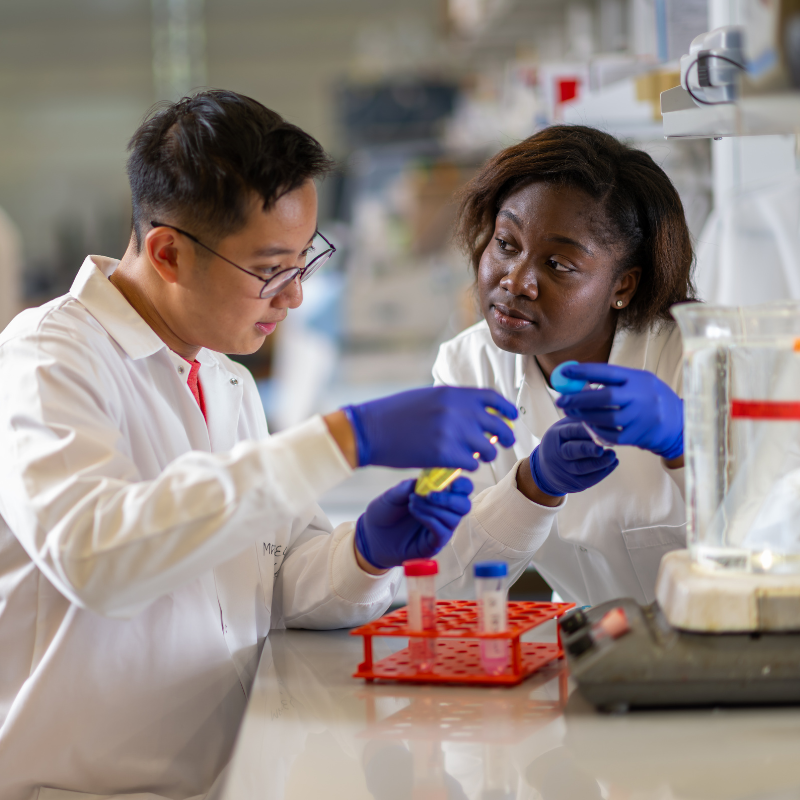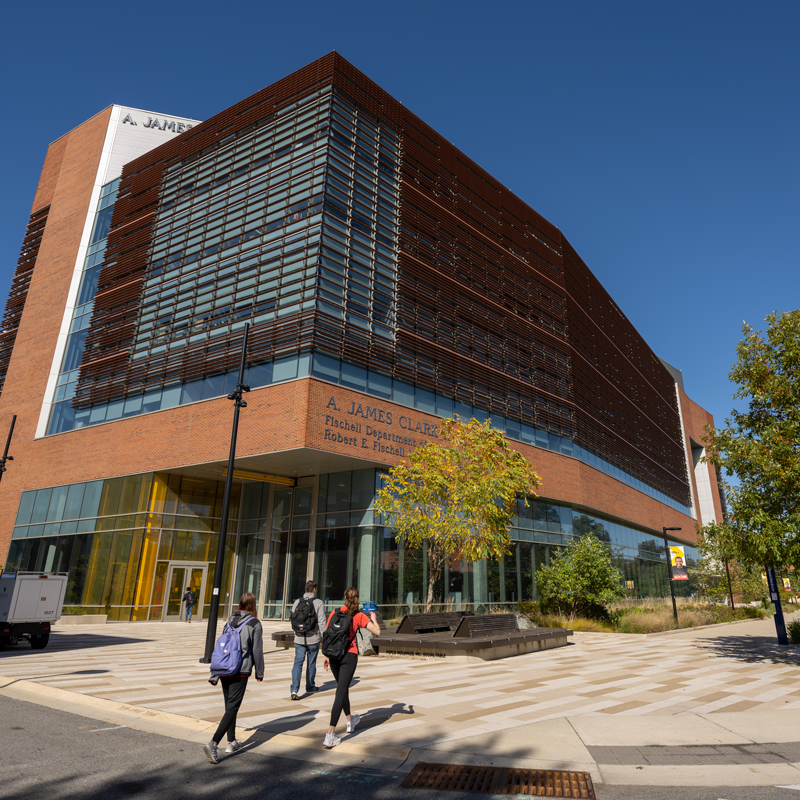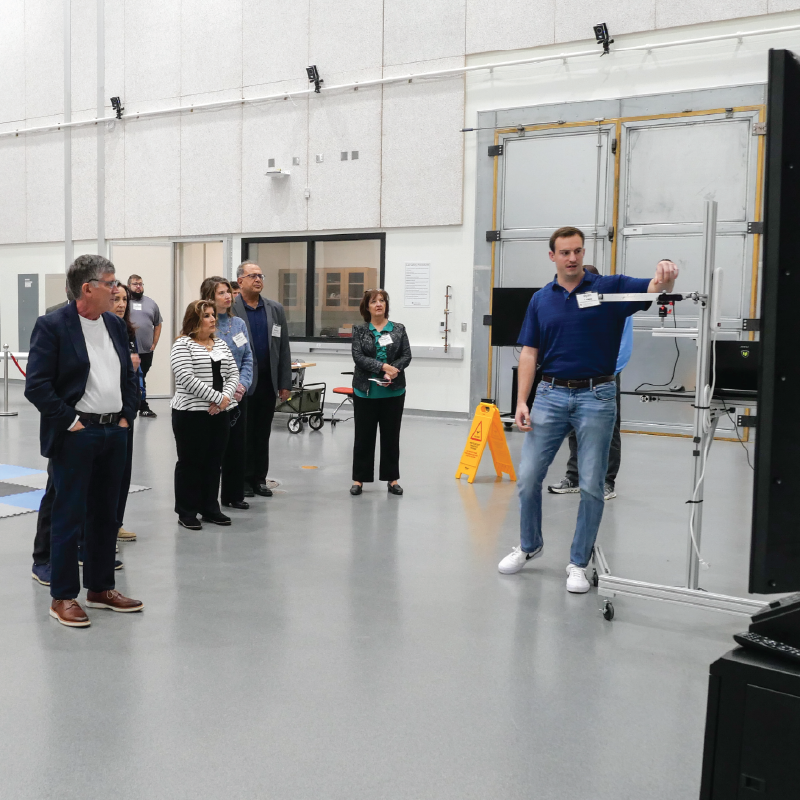News Story
UMD Bioengineering Ascends to #12 in Public Graduate School Rankings

The Fischell Department of Bioengineering (BIOE) at the University of Maryland ascended in rankings to 12th among public universities in bioengineering and biomedical engineering graduate programs, and ranked 28th overall in the nation—the highest ranking the program has received to date—according to U.S. News & World Report’s 2024–25 rankings released today.
Housed in the A. James Clark School of Engineering, which ranked among the country’s top 10 public universities in graduate engineering programs for the sixth consecutive year, BIOE is a forward-thinking academic organization dedicated to developing biologically based knowledge and products to promote ecological, human, and animal health, and to improve the quality of life while maintaining a healthy environment. The department aims to assist the citizens of Maryland and the nation by educating an innovative student body and pioneering groundbreaking, translatable technologies.
This jump from last year’s rankings—an advance of five places among public university rankings and six places nationally—is part of a multi-year trend for the UMD bioengineering programs climbing in academic rankings. In Fall 2023, USNWR ranked UMD’s undergraduate bioengineering program as 8th nationwide among public university bioengineering and biomedical engineering undergraduate programs—raising BIOE one place from the 2022 undergraduate rankings—and ranked it 21st overall in the nation, advancing three rankings from the previous year.
“We are incredibly proud of our graduate program ranking,” says department Chair John P. Fisher. “It reflects the quality teaching, research, and service from our dedicated faculty and staff. It also represents the acumen, leadership potential, and drive of our graduate student body. We strive to be and to foster leaders in the fields of bioengineering and education, and so we are thrilled for our program to be recognized nationally with our highest ranking yet. I look forward to its continued growth.”
EDUCATION
The BIOE graduate program represents the strong intellectual interdisciplinary infrastructure and collaborative culture that links engineering, biology, and medicine at UMD.
Offering a variety of graduate degrees, the program provides research and educational opportunities leading to the Doctor of Philosophy (Ph.D.) degree, Master of Science (M.S.) degree, and the Master of Engineering (M.Eng) degree. In cooperation with the University of Maryland School of Medicine (UMSoM), the bioengineering graduate program also offers the combined Doctor of Medicine/Doctor of Philosophy (M.D./Ph.D.) and Doctor of Medicine/Master of Science (M.D./M.S.) degree programs.
With over 125 students enrolled, the BIOE graduate program aims to provide all students with a basic understanding of bioengineering at the molecular and cellular level and ranges in research focuses across 23 faculty labs, including: biomolecular and cellular rate processes, biomaterials and tissue engineering, drug delivery, cellular and tissue biomechanics, electrophysiology of the cell, cellular and physiological transport phenomena, biomedical imaging biosensors, medical diagnostics systems, bio-devices, and vaccines.
The department also hosts and houses several events and organizations that support graduate student success across academics, research, and personal and professional development.
"[Our graduate program ranking] represents the acumen, leadership potential, and drive of our graduate student body. We strive to be and to foster leaders in the fields of bioengineering and education, and so we are thrilled for our program to be recognized nationally with our highest ranking yet."
John P. Fisher, Chair
The Bioengineering Graduate Student Society (BGSS) is a highly active student organization within the Fischell Department of Bioengineering that works to unite graduate students from across the department’s many research labs into an organization dedicated to aiding academic and professional growth, while providing an outlet for supportive social interaction.
Every summer, BIOE and BGSS jointly host the annual EPIC (Enhancing and Promoting Interactions and Conversations) Retreat to welcome new graduate students to the department, discuss new research, create new collaborations, and foster a sense of community. At the sixth annual retreat in 2023, participants gave research presentations, met with our newest faculty members, and heard from BIOE alumni and leaders in industry.
RESEARCH
With nearly $19 million in research expenditures in 2023, BIOE ranks among the top in annual expenditures among Big Ten bioengineering programs, thanks in large part to our active research relationships with government agencies and industry.
BIOE graduate student research is supported and recognized by a variety of department- and college-level opportunities, and our students are regularly selected for national awards and fellowships from leading organizations and institutions. Notable recognitions of exceptional research from the 2023–24 academic year include:
- Ph.D. candidate Kayla Chun (they/she) was named a recipient of the Clark Doctoral Fellows Mid-Career Award, which recognizes high-achieving doctoral students already progressing in their studies.
- David Boegner and Shannon McLoughlin received the 2023 Fischell Fellowships in Biomedical Engineering, a unique opportunity for talented and innovative graduate students interested in applied research and product design in the biomedical industry.
- Ph.D. students Alex Pueschel, Allison Moses, and Faranguisse Sadrieh were selected for the 2023-2024 MPower Graduate Fellowship, a collaborative Ph.D. program with BIOE and the Schools of Dentistry, Medicine, and Pharmacy (UMB) to work on joint research projects as an opportunity to develop and provide technical solutions for tough clinical challenges in medicine, pharmacy, or dentistry.
- Ph.D. candidate and Clark Doctoral Fellow Ann Ramirez was named a 2024 Rising Graduate Scholar by Diverse: Issues In Higher Education for her continued exceptional scholarship and trajectory toward a promising future in academia and beyond.
PARTNERSHIP
BIOE continues to successfully and increasingly support its graduate students thanks in large part to the dedication of our partners, including the BIOE Advisory Board and several generous donors.
The distinguished members of the BIOE Advisory Board serve the department in an advisory capacity to help identify departmental needs, plan for the future, and develop fundraising strategies to enhance endowment. These volunteers meet twice a year with the department chair and select members of the faculty and staff, working together to better the department now and moving forward. For the past two years, the entire board has donated to the University of Maryland—the first Clark School of Engineering board to have 100 percent giving participation.
Advisory Board member Steven Lehrer ‘82 has led this growing philanthropic mindset among his board colleagues. Having been on the board since 2019 and currently serving as the Chair of the board’s Development Committee, Lehrer encouraged and funded the department’s first matching campaign of $10,000, and offered an Advisory Board challenge gift of $5,000 for 100 percent board giving participation in both 2023 and 2024.
These generous donations have supported: sending graduate students to conferences, including the National Society for Black Engineers 50th Annual Convention; increasing alumni–student networking opportunities; bringing experts in the field to campus as weekly BIOE Seminar speakers; and hosting the annual EPIC Retreat for members of the BIOE graduate program.
Published June 18, 2024









